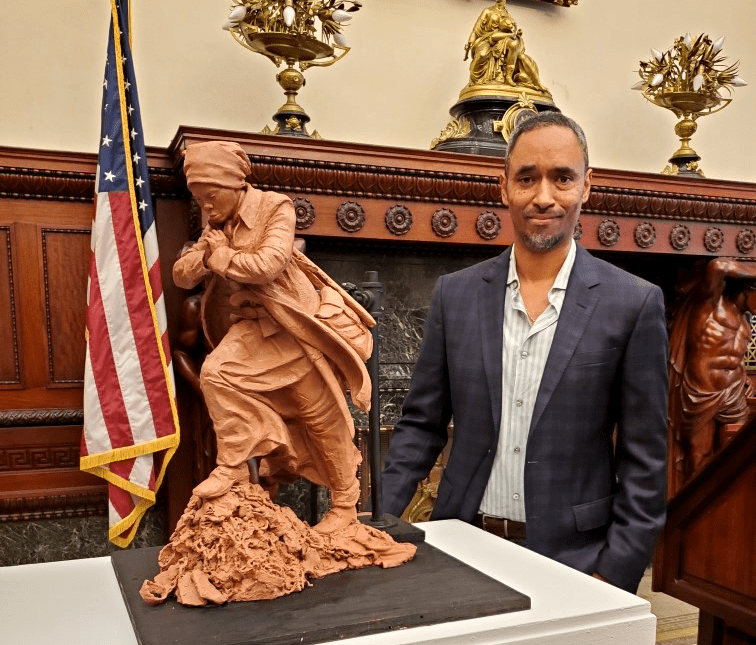
Philadelphia has put public art controversy in its rearview mirror, and is moving forward with its plans for a Harriet Tubman memorial, choosing a design by Alvin Pettit from the five finalist proposals following an open call.
Pettit’s bronze sculpture, titled A Higher Power: The Call of a Freedom Fighter, is a tribute to Tubman’s military service, depicting the great abolitionist with a rifle on her back and pistol at her waist. After escaping slavery, Tubman famously returned to the South on multiple missions to rescue other enslaved people—but she also went on to become the first woman to lead a major military operation in U.S. history, at the 1863 raid at Combahee Ferry during the Civil War.
“I thought it was time to change the narrative,” the artist said at the official announcement of the work’s selection, as reported by the Philadelphia Inquirer. “[Tubman] was also a soldier. She is shown in majestic prayer. Perhaps she is calling upon her faith or contemplating a battle.”
But the work, which will stand 14 feet tall in front of Philadelphia City Hall as a sort of guardian for the city, was originally going to be an entirely different piece by a different artist—until that decision erupted into controversy.
Alvin Pettit, A Higher Power: The Call of a Freedom Fighter, selected by Philadelphia as the design for a new memorial to Harriet Tubman to be erected at City Hall. Photo courtesy of the artist and Creative Philly.
In January 2022, Wesley Wofford, a white male artist, brought his touring sculpture The Harriet Tubman — The Journey to Freedom, to Philadelphia. It was so well-received that the city decided to tap Wofford to make a permanent version of the work.
That June, the planned sculpture sparked a public outcry from those who felt that there should have been an open call for a new Tubman monument, specifically allowing women and Black artists to compete for the honor. Initially, the city stood by its decision, but faced with a letter-writing campaign and petition decrying Wofford’s selection, announced in August 2022 that it would be returning to the drawing board and soliciting new design proposals for the project.
“It was the public’s advocacy that made us pivot from direct commission and seek open call,” Kelly Lee, the city’s chief cultural officer and the executive director of Creative Philly, told the Inquirer.
Alvin Pettit, A Higher Power: The Call of a Freedom Fighter, rendering of the Harriet Tubman memorial at Philadelphia City Hall. Photo courtesy of the artist and Creative Philly.
The city-appointed African-American Statue Advisory Committee ultimately selected Pettit, who also created Jersey City’s monument to civil rights leader Mary Jane McLeod Bethune, as the winner. The other four finalists were Vinnie Bagwell, Tanda Francis, Basil Watson, and Richard Blake. (The latter withdrew after receiving another public commission.) In a public survey conducted in September that received 3,000 responses, Pettit’s design had scored the highest in all seven possible categories.
“I loved the traveling statue. I loved it and I was angry when this controversy started about an open call,” Mayor Jim Kenney said at the unveiling, as reported by local public radio station WHYY, before going on to praise the work that will ultimately go on view.
“I was struck by Alvin Pettit’s design and how it depicts Harriet Tubman’s likeness, evokes her power, and reminds us of her leadership. I was thrilled that the public and our Advisory Committee agreed on Mr. Pettit’s design,” Kenney said in a statement.
Philadelphia has set aside $500,000 from the city operating budget for the project, which is slated to be completed in 2025.
More Trending Stories:
This 15th-Century Painting Might Actually Depict a Prehistoric Tool, New Research Suggests